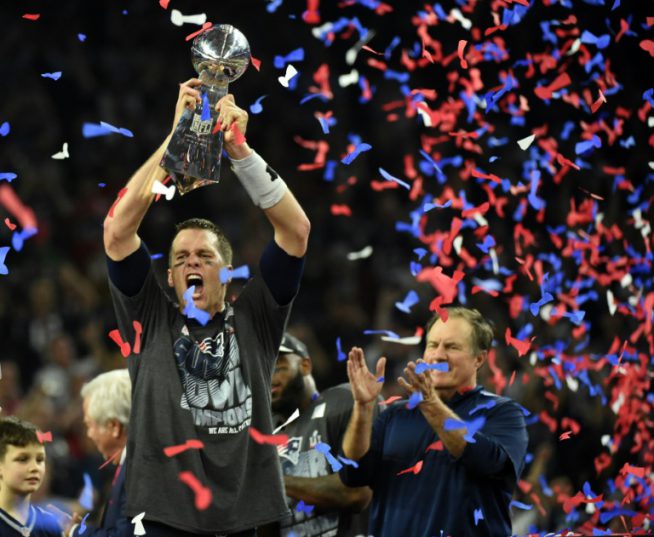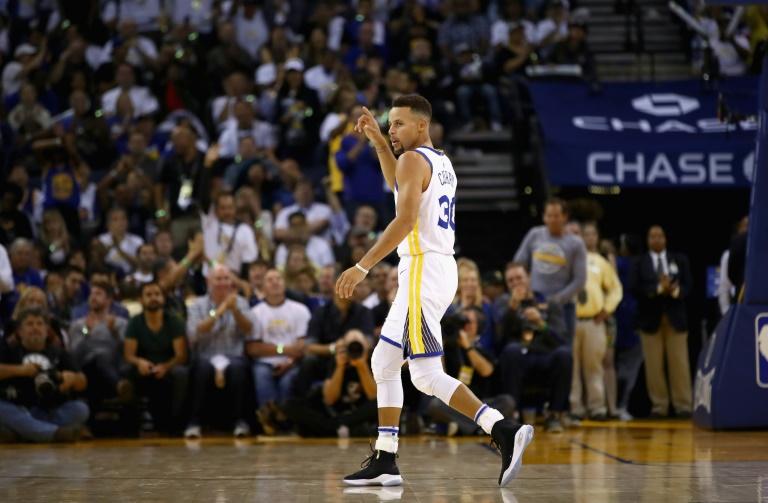Daily Lotto results: Sunday, 23 February 2025
Decades of convention which had allowed the two phenomenally successful professional sports leagues to chug along peacefully, and apolitically, were swept away in the course on one tumultuous weekend in September.
In February, as protests erupted across the nation after Donald Trump’s new administration issued restrictions on visitors from several Muslim nations, participants in Super Bowl 52 mostly stuck to the line that sport and politics should be kept apart.
“I’m not talking politics at all,” said New England Patriots quarterback Tom Brady. “If people want to take sides, they have a right to do that. I have a right to stay out of it too.”
Brady would subsequently go on to lead the Patriots to an astonishing comeback from 28-3 down to defeat the Atlanta Falcons for a record fifth Super Bowl.
In the immediate aftermath of that win, there was no hint of the controversy that would engulf America’s most popular sport soon after the 2017-2018 season kicked off seven months later.
The seeds had been sown a year earlier, when San Francisco 49ers quarterback Colin Kaepernick refused to stand for the national anthem in a protest aimed at drawing attention to injustices suffered by minorities at the hands of law enforcement.
– Trump tirade –
Yet as September rolled around, Kaepernick’s protest movement had largely fizzled.

Participants in Super Bowl 52 mostly stuck to the line that sport and politics should be kept apart, with New England Patriots quarterback Tom Brady saying “I’m not talking politics at all”
Kaepernick, a free agent, had found himself frozen out of the sport, with none of the 32 teams in the NFL seeing any value in a 30-year-old quarterback who had led the 49ers to the brink of a Super Bowl victory only four years earlier.
A handful of players continued to kneel for the anthem in early season games, but as a story, the issue had been mostly forgotten.
That all changed on September 22, when Trump, speaking at a rally in Alabama, raised the issue of NFL players who refused to stand for the anthem.
To loud cheers, Trump said NFL owners should respond to the players by saying, “Get that son of a bitch off the field right now, he’s fired. He’s fired!”.
The following day, Trump turned his attention to the NBA’s reigning champions Golden State and their star point guard, Stephen Curry.
Curry, like many of his Warriors team-mates an outspoken critic of Trump, had earlier indicated he would be reluctant to visit a White House reception if the team was invited. Trump responded by withdrawing the team’s invitation.
“Going to the White House is considered a great honor for a championship team. Stephen Curry is hesitating, therefore invitation is withdrawn!” he wrote.
Trump’s outburst drew sharp criticism, with Cleveland Cavaliers superstar LeBron James leading the charge.
“U bum @StephenCurry already said he ain’t going!” James wrote on Twitter. “So therefore ain’t no invite. Going to White House was a great honor until you showed up.”
– ‘Lack of respect’ –
The NFL, meanwhile, united in its response to Trump’s criticism of players who protest.

Stephen Curry of the Golden State Warriors, an outspoken critic of President Donald Trump, indicated he would be reluctant to visit a White House reception if the team was invited
“Divisive comments like these demonstrate an unfortunate lack of respect for the NFL, our great game and all of our players,” NFL commissioner Roger Goodell wrote in a statement.
NFL team owners issued statements condemning Trump’s comments.
But the most resounding statement came on the following Sunday, two days after Trump’s comments, when a wave of player protests erupted across the league in the biggest single demonstration of political activism in NFL history.
All told, around 150 players across the league took to one knee during the playing of the US national anthem, instantly reigniting Kaepernick’s cause.
“We felt like President Trump’s speech was an assault on our most cherished right — freedom of speech,” Denver star Von Miller explained.
Trump’s anti-NFL invective has continued, as have the player protests, albeit on a smaller scale.
The NFL meanwhile has had to navigate a difficult course, on the one hand defending protesting players from political attack while at the same time not antagonising fans who see refusal to stand for the anthem as an affront bordering on treason.
Goodell has led talks with protesting players and the NFL has pledged nearly $100 million to charities which deal with criminal justice reform, law enforcement/community relations and education.
The NFL hierarchy hopes the pledge will help draw a line under its season of protest, although there is no explicit requirement for players to refrain from demonstrating during the anthem.
Download our app